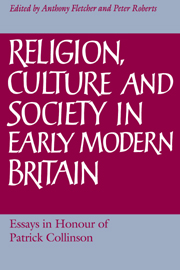Book contents
- Frontmatter
- Contents
- List of illustrations
- List of contributors
- Preface
- List of abbreviations
- Patrick Collinson
- 1 Nicolas Pithou: experience, conscience and history in the French civil wars
- 2 Elizabethan players and minstrels and the legislation of 1572 against retainers and vagabonds
- 3 Cleanliness and godliness in early modern England
- 4 Blood is their argument: men of war and soldiers in Shakespeare and others
- 5 Pragmatic readers: knowledge transactions and scholarly services in late Elizabethan England
- 6 The gardens of Sir Nicholas and Sir Francis Bacon: an enigma resolved and a mind explored
- 7 The Protestant idea of marriage in early modern England
- 8 James VI and I: furnishing the churches in his two kingdoms
- 9 A British patriarchy? Ecclesiastical imperialism under the early Stuarts
- 10 The Anglo-Scottish Union 1603–1643: a success?
- 11 Popery, purity and Providence: deciphering the New England experiment
- 12 Provincial preaching on the eve of the Civil War: some West Riding fast sermons
- 13 Popular form, Puritan content? Two Puritan appropriations of the murder pamphlet from mid-seventeenth-century London
- 14 The two ‘National Churches’ of 1691 and 1829
- Bibliography of the published writings of Patrick Collinson, 1957–1992
- Index
1 - Nicolas Pithou: experience, conscience and history in the French civil wars
Published online by Cambridge University Press: 03 December 2009
- Frontmatter
- Contents
- List of illustrations
- List of contributors
- Preface
- List of abbreviations
- Patrick Collinson
- 1 Nicolas Pithou: experience, conscience and history in the French civil wars
- 2 Elizabethan players and minstrels and the legislation of 1572 against retainers and vagabonds
- 3 Cleanliness and godliness in early modern England
- 4 Blood is their argument: men of war and soldiers in Shakespeare and others
- 5 Pragmatic readers: knowledge transactions and scholarly services in late Elizabethan England
- 6 The gardens of Sir Nicholas and Sir Francis Bacon: an enigma resolved and a mind explored
- 7 The Protestant idea of marriage in early modern England
- 8 James VI and I: furnishing the churches in his two kingdoms
- 9 A British patriarchy? Ecclesiastical imperialism under the early Stuarts
- 10 The Anglo-Scottish Union 1603–1643: a success?
- 11 Popery, purity and Providence: deciphering the New England experiment
- 12 Provincial preaching on the eve of the Civil War: some West Riding fast sermons
- 13 Popular form, Puritan content? Two Puritan appropriations of the murder pamphlet from mid-seventeenth-century London
- 14 The two ‘National Churches’ of 1691 and 1829
- Bibliography of the published writings of Patrick Collinson, 1957–1992
- Index
Summary
The closing pages of Jean Morély's Traicté de la discipline & police chretienne, published in Lyons amidst the first civil war in 1562, contained an interesting suggestion. He completed his critique of the newly agreed French Protestant discipline by proposing that, in each province of the French churches, ‘a grave, wise and learned person’ should be selected ‘who should be entrusted to compile its Ecclesiastical history’. By means of this public record of each Protestant congregation's trials and tribulations the community at large in France would have an ‘eternal witness’ from which it might draw strength and direction for its future. Morély deliberately avoided saying that it would be written by a pastor; in his view, the active embodiments of the congregation were more likely to come from the laity. The suggestion was one part of a book which placed a pétard under the chassis of the freshly framed Discipline of the French Protestant churches. The propositions it contained would be anxiously debated at the fourth National Synod, meeting in Morély's native Lyons in August 1563. A bitter controversy ensued, echoing through the colloquies and synods of French Protestantism during the following decade. But his proposal for ecclesiastical histories, appropriately tamed by the Genevan pastorate, was generally welcomed. The decision was taken: ‘que les églises seront adverties de faire un recueil fidèle de tout ce qui est arrivé de plus remarquable par la Providence diuine aux lieux de leur ressort et d'en enuoyer les relations à nos révérends frères de Genève, avec toute la diligence possible’.
- Type
- Chapter
- Information
- Religion, Culture and Society in Early Modern BritainEssays in Honour of Patrick Collinson, pp. 1 - 28Publisher: Cambridge University PressPrint publication year: 1994



